
Full text of the Maynooth Declaration
Community Development for Rights, Recognition and Re-distribution
The World Community Development Conference 2018
Maynooth Declaration
Recognising the many challenges, including poverty, racism and inequality, which are enduring features of all societies and present the context for community development throughout the world;
Acknowledging that the way we use and treat our world is unsustainable and that there is an urgent need for climate and environmental justice actions globally;
Emphasising the intersectional nature of poverty and oppression, which exacerbates injustice and rights abuses and systematically ignores and undermines the diversity of cultures, communities and peoples throughout our world;
Resisting neo-liberalism as a key contributor to the persistence and growth of poverty globally and the creation of economic systems that sustain and deepen inequalities, eroding the capacity of national governments to uphold their responsibilities as human rights duty bearers;
Remembering the role community development workers have played in mobilising communities and creating the conditions for civil society to address needs, concerns and interests;
Reasserting our commitment to the Universal Declaration of Human Rights in this its 70th anniversary, the international human rights architecture enshrined in human rights treaties and covenants of the United Nations, as well as the UN Sustainable Development Goals essential for our future and regional multilateral organisations across the globe;
We, the delegates at the World Community Development Conference held in Maynooth University, Ireland in June 2018, make the following declaration collectively:
We reaffirm community development as a process where people concerned with human rights, economic, social and environmental justice act collectively to change societal circumstances. With good processes determining good outcomes, community development will continue to address power imbalances and strengthen the capacities of rights holders to define, claim and realise their rights by holding stakeholders to account. Supporting and valuing the diversity of communities, community workers will continue to address the causes and consequences of marginalisation and oppression on the basis of key factors including but not exclusive to, gender, ‘race’ and class.
We value the on-going contribution of community development to addressing local to global concerns. We recognise its contribution to the deepening and invigorating of democracy, in the creation of better policy, in enhancing equality and in realising rights, in contributing to social cohesion, and in strengthening the collective voice of communities experiencing poverty, prejudice, social exclusion and inequality in the decision making processes that affect their lives.
We reconfirm community development as a proven means of building a just, sustainable and peaceful world and call on local, national, regional and global authorities and governments to recognise, support and sufficiently resource independent community work through appropriate political leadership, funding, policy and legislation.
ENDS.
